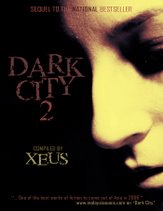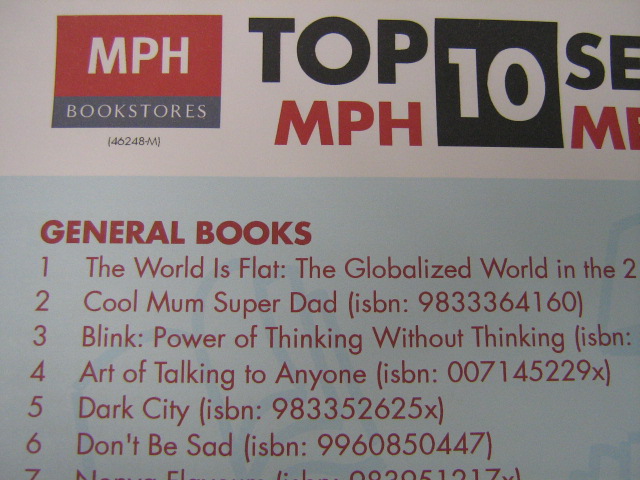Editors and editing
My publisher was complaining to me about an editor he had engaged the other day.
He says, "_________ doesn't really do full editing. He/she just makes some remarks on
the side of the page. That isn't good enough. What about all the grammatical mistakes?"
And you know, he's right. There are many layers of editing:
1. Conceptual editing - where the editor comments on the story, the flow, the relevance of
certain segments and characters etc
2. Grammatical editing
Both are extremely important.
I'm more of a conceptual editor than grammatical one. That's why I still need the publisher
to hire one who can correct grammatical and typesetting mistakes.
A friend of mine was commenting on how one of the writers in Malaysia (with an ego to boot)
was criticising his editor. "If (the editor) was a good enough editor, he/she would have
caught this, and then I wouldn't have to rewrite the whole segment."
I think that's extremely unfair of the writer. Editing, like writing and reading, is a matter of taste.
Then again, I have heard stories of some editors who won't go the mile. And yet they will charge you for going the mile!
Any experiences, either personal or through your friends?



17 comments:
Writers should really get their mansuscript into its best form, fixing any mistakes etc, before submitting it to an editor.
Pretend you don't have an editor and do all the writing and editing yourself. A writer's skills will improve considerably.
But editors are indispensable. Writers are too close to the work to assess it properly. But this stage happens only after the writer thinks the manuscript is "perfect".
Yes - you are absolutely right, Tunku Halim. It is imperative that writers learn to revise and self-edit their typescript before sending it to the editor. Most writers tend to send their typesecripts without polishing them, hoping that their editor will clean everything up for them.
Tunku Halim and Eric, very valid point. Writers should treat the manuscript as though they are sending to a foreign agent!
Now that I've turned editor as well, I feel every iota of the pain editors feel when they receive a bad manuscript.
Anyway, it was so lovely to meet up with you both yesterday and to exchange books. TH, you're a lot more dashing that your photos! And it's always lovely to meet up with Eric and discuss books.
Just sent another good writer your way, Eric.
Xues, came here from Tunku Halim. Yes, can we meet up? I am planning to meet Lydia again..it'll be nice to meet writers and perhaps ...oh dont, know, just perhaps!
Am taking notes of what you are discussing here.
Hi all, editing can be such a painful process but when the prose has been trimmed and tightened to shine, the pain is worth it.
"If (the editor) was a good enough editor, he/she would have
caught this, and then I wouldn't have to rewrite the whole segment."
The reverse applies. If he/she was a good enough writer, he/she wouldn't have made this mistake in the first place. =)
I know someone who writes for a few newspaper columns. She basically bangs out an article, and submits it without any revision. Her excuse is: "I got so many things to do and I am short on time. I just allow my editors to sort out my mistakes."
Poor editors. She gets all the credit and kudos. They don't.
Personally, I always try my best not to irk my editors with grammar or spelling mistakes. I even go through the trouble of reading my work out loud. The only editorial issues I usually have are mostly plot points and story flow. God knows I already irk my editors enough when I disagree with their conceptual assessments.
Xeus will attest to that. =)
Lydia - Yes, editing can be a very traumatic experience, but when both writer and editor work well together, the end product is something to behold. Lydia is one writer who believes in rewriting and revising; she is a joy to work with because she is really passionate about her work. She’s is indeed God’s gift to editors!
John – Yes, writers need to learn to self-edit more. And thanks for highlighting the travails of editors!
This is the first time my story is going public and even though I felt cheated of my money, I'm not revealing her name.
I paid a four-figure fee to an editor that went through my book manuscript only to find her advising me that my book should be written in 'such and such' concept or it won't do well.
Even worse, she offered, "Or I can ghost-write for you too."
I was deeply insulted. What makes her think she can write my story better than I?
Anyway, do you know why she had asked me to change my book concept? Because she's selling a course and
said I'd benefit from her course.
That's why she strongly recommended that I change the way my book was written.
After I didn't buy that idea, she went further to offer me her course for free!!! The catch, I must endorse her course.
I decided not to keep in touch with such dishonest 'editor'. Till date, she had never even asked me about my book. No follow up what-so-ever. I think she knew I knew what she was up to.
I've been fortunate that my book did very well. An international publisher took it and close friends were aghast at the type of editing she did!
Such a pity I was a newbie and realised too late, after having paid for her service that she's no editor.
How does one call oneself an editor, ( just because one self-published one obscure book?) this question is directed to Eric Forbes, a real nice person I knew.
There are so many self-proclaimed editors out there.
Does having vetted through the work of a bunch of author-wannabes makes one an editor? Or simply by self- publishing one's work makes one an editor? I even have a 15-year-old self published teen who claims she edited her own work and gotten published? Boleh kah??? Doesn't she need a fresh eye or professional editor?
I only consider an editor a real editor if he/she is attached with a publication.
Lastly, I confess ( and many of my real friends like Xeus and others also know of this): that my English grammar is not great but I have ideas that selected editors and publishers buy into. That's why I've been published by big name publications . I'm still learning to improve my English and I sincerely thank lots of real editors for that.
Thanks Xeus. I know this has been long-winded but it got off my chest, finally!
There really is no one way to write a book. Or even to edit one!
Honestly, after being an editor for so many years, I still find the task of editing a manuscript a monumental effort. In fact, most of the time, it is a task fraught with trauma!
Firstly, there’re not many good editors to go round not only in Malaysia but elsewhere too. Good editors are hard to come by. Most publishers, sad to say, do not believe in investing in good editing skills. And good editing skills can only come from excellent writing skills, good grammatical skills, good rewriting and revising skills, etc. And you can’t learn these skills overnight, believe me. They come from years of experience editing, reading and writing. Yes - and lots of hard work, too. And there’s only so much an editor can do with a manuscript, what with the other duties that editors are obligated to do. Editors don’t just edit. Therefore, writers must make an effort to ensure that their manuscripts are of an acceptable standard for editors to work on.
Yes, like everything else in life, there're good and bad editors.
When typescripts or manuscripts are badly written, I would advise writers to rewrite them because it is too time-consuming and expensive to edit them to be re-submitted at a later date.
Kak Teh, it would be lovely to meet up! Lydia, you and I can go for tea or something :)
Lydia, actually you are one of the writers who really put so much effort into making sure your work is the best it can be before editing. Not many people do that.
John, the newspaper editors hate that too! They hate doing so much work. That's why they always approach the same writers who don't give them much grief again and again.
And besides, John, you are a joy to edit! No grammar mistakes. No typos. It's always only conceptual editing, and that too is a matter of opinion. But I do find that the more one 'studies' books, the more they will start to think conceptually as in - does this theme belong here? Is this too much tell, not show?
If I show you one of my works in progress as well, you'd have a lot to say about it! Ask Lydia - she read the first draft of my children's book.
Anonymous, I was thinking of you when I wrote this too! Your story is something all writers and editors can learn from and not repeat. And believe me, your grammar is far better than a lot of people I know!
Everyone I know thinks you have a lot of great ideas and a very refreshing way of telling a story. That's terribly important.
At least all the major publishing houses will never stint on their editors. And besides, we always have great editors like Eric and Sharon.
Eric, thanks for your compliment :)
Anon, I also have problems with grammar! Given a choice of a story with a sprinkling of grammar boo-boos but fresh angle and another which has perfect grammar but boring content, guess which I'll choose? Don't bang yourself up on that, grammar skills and prose-tightening can be learned.
Xeus, yep, conceptual editing can be so subjective.
Wow, interesting and emotion-laden topic!
I have an ex-classmate who wrote a book about ways to learn to relax and deal with stress. The publisher engaged a foreign editor for her who did such a poor job that a book reviewer had no choice but to mention the numerous grammatical errors. The look of the book was rather amateurish, too.
The author was upset, but I did point out to her the reviewer mentioned all the good points she saw too.
One way to avoid a 'bad' editor is to engage one that comes with references and recommendations.
Argus Lou
If you were a publisher, would you publish a book that is well written but lack content and suffused with cliches? If there is a market for such books, would you publish it?
I would like to add to what Anon said about the role of a publisher. Do you publish anything that comes along and let the public decide whether it is any good? In this case, the publisher is playing the role of a nurturer. Or do you wait for a good book to come along and only then publish it? Here the publisher plays the role of filtering quality. We must not forget the fact that publishing is subject to the dynamics of the marketplace. What do you all think?
Wow. So many Anons!!
I would certainly vet out all the bad stories if I were a publisher. Then again, good and bad is very subject. But the writer certainly must have good grammar, a good plot and good storytelling abilities. No cliches, as much as possible, unless it was a comedy.
Post a Comment